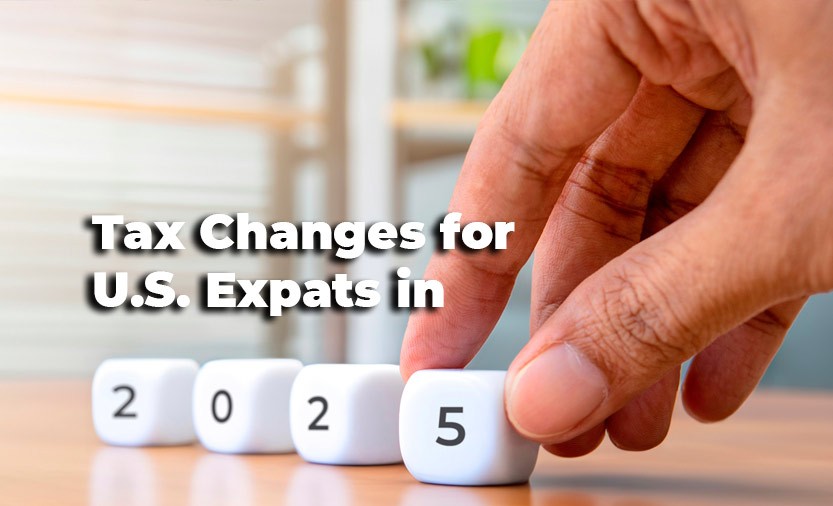
Living abroad as a U.S. citizen comes with unique tax responsibilities. The IRS and FinCEN have introduced several updates for the 2025 tax year that could impact your filing strategy. Staying informed is essential to avoid penalties and optimize your tax benefits. Here’s a breakdown of the most important changes every expat should know.
IRS Updates for U.S. Citizens Abroad
Foreign Earned Income Exclusion (FEIE) Increase
The Foreign Earned Income Exclusion (FEIE) threshold has increased to $130,000 for the 2025 tax year, up from $126,500 in 2024. This exclusion allows qualifying U.S. expats to exclude a portion of their foreign-earned income from U.S. taxation. To qualify, you must meet either:
– The Bona Fide Residence Test, or
– The Physical Presence Test, which requires being physically present in a foreign country for at least 330 full days during a 12-month period.
These changes are crucial for those navigating US expat taxes 2025.
Standard Deduction Increase
The standard deduction has also increased for 2025:
– Single filers: $15,000
– Married filing jointly: $30,000
This increase can help reduce taxable income and potentially lower your overall tax liability. It’s an important update in IRS updates for expats.
Tax Filing Deadlines for Expats
U.S. expats benefit from extended tax deadlines for expats in 2025:
– April 15, 2026: Standard deadline for filing and payment. Interest begins accruing on unpaid taxes after this date.
– June 15, 2026: Automatic 2-month extension to file for expats. No form is required.
– October 15, 2026: Extended deadline if Form 4868 is filed by June 15.
– December 15, 2026: Final extension available upon written request to the IRS.
Additional reporting deadlines include:
– April 15, 2026: FBAR (FinCEN Form 114) deadline, with an automatic extension to October 15.
– June 15, 2026: FATCA (Form 8938) deadline, aligning with the extended tax return deadline.
Child Tax Credit (CTC) Update
The Child Tax Credit for expats has increased to $2,200 per qualifying child under age 17. However, expats using the FEIE can only claim the nonrefundable portion. To access the refundable portion, consider using the Foreign Tax Credit (FTC) instead.
Refundable Portion (Additional Child Tax Credit):
– Up to $1,700 is refundable, even if no federal income tax is owed.
– This is especially beneficial for low- to moderate-income families.
Eligibility Requirements:
– The child must be under 17 at the end of the tax year, have a valid Social Security number, and be claimed as a dependent.
– The taxpayer must also have a valid SSN.
– Income phase-outs begin at:
– $400,000 for married filing jointly
– $200,000 for single filers and heads of household
Reporting Foreign Accounts: FBAR & FATCA
FBAR (FinCEN Form 114): You must file an FBAR if the aggregate value of your foreign financial accounts exceeds $10,000 at any time during the year. This is a key requirement in FBAR FATCA reporting.
FATCA (Form 8938): This form is required for specified foreign assets above certain thresholds:
Thresholds for Expats:
– Single / Head of Household / Married Filing Separately:
– $200,000 on the last day of the year
– $300,000 at any time during the year
– Married Filing Jointly:
– $400,000 on the last day of the year
– $600,000 at any time during the year
Specified Foreign Financial Assets Include:
– Foreign bank and brokerage accounts
– Foreign pensions and retirement accounts
– Foreign mutual funds, hedge funds, and private equity
– Foreign-issued life insurance or annuities with cash value
– Interests in foreign partnerships, trusts, or corporations
Note: Foreign real estate held directly is not reportable, but if held through a foreign entity, it is.
Conclusion
Navigating US expat taxes 2025 can be complex, but understanding these IRS updates for expats will help you stay compliant and make informed decisions. From the increased Foreign Earned Income Exclusion to the updated Child Tax Credit for expats and FBAR FATCA reporting requirements, staying ahead of these changes is essential. If you’re unsure how these updates apply to your situation, consult us at US Tax Consultants, we specialize in expat taxation. Proactive planning today can save you time, stress, and money tomorrow.
If you live in Spain US Tax Consultants
and if you live in Portugal US Tax Consultants


0 comentarios